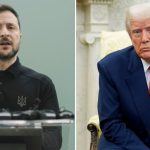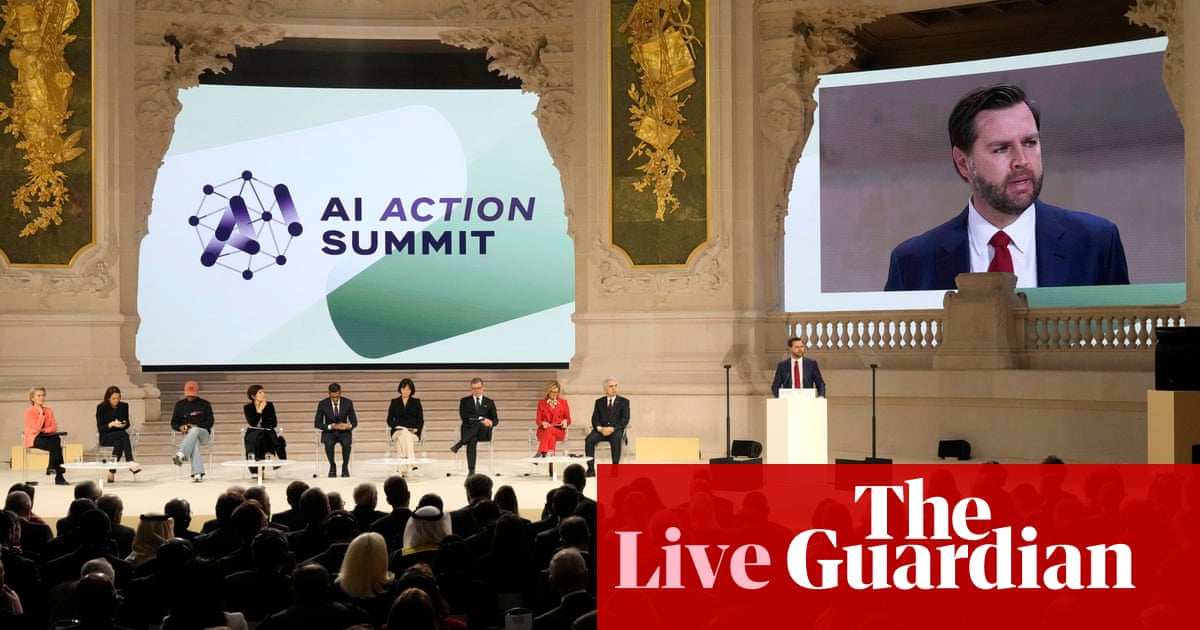Vance issues a warning shot against EU ‘excessive’ regulation of AI and tech
In a stark segment of his speech, JD Vance repeatedly criticises EU regulation of AI and technology.
He says:
America wants to partner with all of you. We want to embark on the AI revolution before us with the spirit of openness and collaboration.
But to create that kind of trust, we need international regulatory regimes that fosters the creation of AI technology rather than strangles it, and we need our European friends in particular, to look to this new frontier with optimism, rather than trepidation.
He picks up Trump’s comments on potential enforcement against US Big Tech companies and says “America cannot and will not accept that.”
However, the Trump administration is troubled by reports that some foreign governments are considering tightening the screws on US tech companies with international footprints.
America cannot and will not accept that, and we think it’s a terrible mistake, not just for the United States of America, but for your own countries.
Key events
-
Europe could be ‘one of the leading AI continents,’ EU von der Leyen says, as she ignores Vance’s comments
-
‘Focus matters,’ Vance says, as he calls for focus on opportunities, not risks
-
Workers need a seat at the table in AI talks, Vance says
-
Vance says US will block AI, tech falling into authoritarian hands, with comments likely to be seen as a thinly-veiled shot at China
-
Vance warns against AI regulation and censorship
-
Vance takes direct aim at EU’s Digital Services Act and GDPR laws
-
Vance issues a warning shot against EU ‘excessive’ regulation of AI and tech
-
Excessive regulation could paralyse AI, Vance warns
-
‘Not here to talk about safety, but opportunity,’ US VP Vance says
-
We’re ‘at the dawn of the AI age that will shape humanity,’ Indian PM says
-
We need to ’embrace progress’ with AI, Macron says
-
EU ‘will respond as one’ to US tariffs if not given choice, Germany’s Scholz says, but warns ‘trade wars cost prosperity’
-
Day 2 of AI Action Summit in Paris under way
-
EU trade chief calls US tariffs ‘economically counterproductive’ and promises response
-
EU to trigger ‘firm and proportionate countermeasures’ against US tariffs, von der Leyen says
-
Morning opening: The Art of the Deal
Google CEO Sundar Pichai is now on stage, in conversation with American musician Pharrell Williams and Anne Bouverot, France’s special envoy for AI.
Pichai says that AI will “profoundly impact many areas,” giving AlphaFold as an example.
It used to take one person their entire PhD to do one protein and within three months, AlphaFold unlocked over 200 million protein structures. Now it’s an open database, and already we see hundreds of 1000s of researchers and biologists using it to develop vaccines, etc, so you can so tangibly feel the impact of progress.
He says he worries about “people who do not adopt it, countries which do not embrace it, and can get left behind through this crucial moment.”
He also talks about AI risks, highlighting the need to “think about image or video generation,” which can be used for both creative purposes and deepfakes, and so need standards to control them.
Europe could be ‘one of the leading AI continents,’ EU von der Leyen says, as she ignores Vance’s comments
European Commission Ursula von der Leyen is up next on stage and the contrast between the two dynamic and the tone of the two speeches could not be bigger.
She says this is “the third summit on AI safety in just one year,” and yet “three new generations of ever more powerful AI models have been released in that time.”
She says she wants Europe to “be one of the leading AI continents,” and dismisses suggestions – including by Macron himself! – that “Europe is late to the race, while the US and China have already got ahead.”
“The AI race is far from over. Truth is, we are only at the beginning. The frontier is constantly moving, and global leadership is still up for grabs,” she says.
She says Europe wants its own “distinctive approach to AI,” focused on collaborative, open-source solutions.
She says the bloc “wants to replicate the success story of the CERN laboratory in Geneva,” with AI Gigafactories used to help and train very large models.
“We provide the infrastructure for large computational power. Researchers, entrepreneurs and investors will be able to join forces,” she says.
She ends by pledging additional €50bn for AI investment in the EU, bringing the total to €200bn.
Very notably, she does not respond to many of Vance’s criticisms of the EU and sticks to her speech.
‘Focus matters,’ Vance says, as he calls for focus on opportunities, not risks
Vance closes his speech with a reference to French military officer Marquis de Lafayette, who served during the American War of Independence.
He says he was given a chance to hold his sword during his tour of Paris last night, and it made him think about France, the US, and “the beautiful civilisation that we have build together.”
He says that sabres “are dangerous in the wrong hands, but are incredible tools for liberty and prosperity in right hands.”
He adds that “if we choose the wrong approach on other things that could be conceived of as dangerous, things like AI, and choose to hold ourselves back, it will alter not only our GDP or the stock market, but the very future of the project that Lafayette and the American founders set off to create.”
“This does not mean that all concerns about safety go out the window, but focus matters, and we must focus now on the opportunity to catch lightning in a bottle,” he says.
With great confidence, I can say it is an opportunity that the Trump administration will not squander, and we hope everyone convened here today feels exactly the same.
And that’s it.
Workers need a seat at the table in AI talks, Vance says
He then turns back to the issue of protecting workers, saying the “Trump administration will guarantee American workers a seat at the table” when discussing how AI will change our societies.
Vance says US will block AI, tech falling into authoritarian hands, with comments likely to be seen as a thinly-veiled shot at China
Continuing his speech, Vance now turns to “hostile foreign adversaries” who he says “have weaponised AI software to rewrite history, surveil users, and censor speech.”
He says the Trump administration “will block such efforts full stop,” and safeguard US technologies from “theft and misuse.”
In a passage likely to be read in the context of China, he says:
I would also remind our international friends here today that partnering with such regimes, it never pays off in the long term, from CCTV to 5G equipment, we’re all familiar with cheap tech in the marketplace that’s been heavily subsidised and exported by authoritarian regimes.
But as I know, and I think some of us in this room have learned from experience, partnering with them means chaining your nation to an authoritarian master that seeks to infiltrate, dig in and seize your information infrastructure.
Should a deal seem too good to be true, just remember the old adage that we learned in Silicon Valley: if you aren’t paying for the product, you are the product.
Vance warns against AI regulation and censorship
Vance briefly focuses on energy, saying “AI cannot take off unless the world builds the energy infrastructure to support it.”
But he then returns to the theme of regulation:
We face the extraordinary prospect of a new Industrial Revolution, one on par with the invention of the steam engine or Bessemer steel, but it will never come to pass if over regulation deters innovators from taking the risks necessary to advance the ball. Nor will it occur if we allow AI to become dominated by massive players looking to use the tech to censor or control users thoughts. …
Who is most aggressively demanding that we, meaning political leaders gathered here today, do the most aggressive regulation? It is very often the people who already have an incumbent advantage in the market.
He turns to examples of what he calls “ahistorical social agendas” replicated through AI in the last few years, and says “the Trump administration will ensure that AI systems developed in America are free from ideological bias and never restrict our citizens right to free speech.”
Vance takes direct aim at EU’s Digital Services Act and GDPR laws
He continues:
The US innovators of all sizes already know what it’s like to deal with onerous international rules. Many of our most productive tech companies are forced to deal with the EU’s Digital Services Act and the massive regulations it created about taking down content and policing so called misinformation.
And of course, we want to ensure the Internet is a safe place, but it is one thing to prevent a predator from preying on a child on the internet, and it is something quite different to preventing a grown man or woman from accessing an opinion that the government thinks is misinformation.
He then turns on to the EU’s data protection rules, the GDPR:
Meanwhile, for smaller firms, navigating the GDPR means paying endless legal compliance costs or otherwise risking massive fines. Now, for some the easiest way to avoid the dilemma has been to simply block EU users in the first place. Is this really the future that we want?
Vance issues a warning shot against EU ‘excessive’ regulation of AI and tech
In a stark segment of his speech, JD Vance repeatedly criticises EU regulation of AI and technology.
He says:
America wants to partner with all of you. We want to embark on the AI revolution before us with the spirit of openness and collaboration.
But to create that kind of trust, we need international regulatory regimes that fosters the creation of AI technology rather than strangles it, and we need our European friends in particular, to look to this new frontier with optimism, rather than trepidation.
He picks up Trump’s comments on potential enforcement against US Big Tech companies and says “America cannot and will not accept that.”
However, the Trump administration is troubled by reports that some foreign governments are considering tightening the screws on US tech companies with international footprints.
America cannot and will not accept that, and we think it’s a terrible mistake, not just for the United States of America, but for your own countries.
Vance also says that AI models should be kept free of “ideological bias,” warning that that “American AI will not be co opted into a tool for authoritarian censorship.”
He also says that the US administration will keep a pro-worker focus when looking at the roll out of technology.
Excessive regulation could paralyse AI, Vance warns
JD Vance continues, talking about “revolutionary applications” of AI and the need to deregulate to allow for its fast development and its roll out.
Our administration, the Trump administration, believes that AI will have countless revolutionary applications and economic innovation, job creation, national security, health care, free expression and beyond, and to restrict its development now will not only unfairly benefit incumbents in the space, it would mean paralysing one of the most promising technologies we have seen in generations.
He warns that “excessive regulation of the AI sector could kill a transformative industry just as it’s taking off,” calling he would like to see “that deregulatory flavour making its way into a lot of the conversations during this conference.”
‘Not here to talk about safety, but opportunity,’ US VP Vance says
US vice-president JD Vance is speaking now, and he opens with a comment on how much the debate on AI has moved on since the 2023 summit in Bletchley Park in Britain.
I’m not here this morning to talk about AI safety, which was the title of the conference a couple of years ago. I’m here to talk about AI opportunity.
When conferences like this convene to discuss a cutting edge technology, oftentimes, I think our response is to be too self conscious, too risk averse. But never have I encountered a breakthrough in tech that so clearly calls us to do precisely the opposite.
We’re ‘at the dawn of the AI age that will shape humanity,’ Indian PM says
In his speech, Indian prime minister Narendra Modi speaks of the potential of AI, including in healthcare, but warns about “many biases we need to think carefully about.”
He says the technology is “developing at an unprecedented scale and speed,” and requires a “collective global effort” to introduce governance and standard frameworks to make sure it works as intended and no country, including in the global south, is excluded.
He says that while many fear job losses, there is also potential to “invest in skilling and re-skilling our people,” and says India is uniquely positioned with diverse pool of talent.
“We are at the dawn of the AI age that will shape the course of humanity. Some people worry about machines becoming superior in intelligence to humans, but no one holds the key to our collective future and shared destiny, other than us, humans. That sense of responsibility must guide us,” he says.
We need to ’embrace progress’ with AI, Macron says
Opening Day 2 of the AI Action Summit in Paris, French president Macron makes a reference to the 1937 Expo held there, saying that the French Nobel prize winning physicist Jean Baptiste Perrin used the event to “embrace progress and succeed in having science at the service of humanity.”
“This is exactly our challenge with artificial intelligence,” he says.
EU ‘will respond as one’ to US tariffs if not given choice, Germany’s Scholz says, but warns ‘trade wars cost prosperity’
But before we cover the Paris event, let’s very quickly take a look at what German chancellor Olaf Scholz said in the Bundestag this morning, at the last discussion on current affairs in the parliament before the election of 23 February.
Speaking about the prospect of US tariffs, he said:
If the US does not give us any other choice, the EU will respond as one. As the largest market in the world, with 450 million citizens, we have the strength to do so.
But I hope that we are spared the misguided path of tariffs and countertariffs. In the end, trade wars always cost both sides prosperity.
But in an highly political speech, as you would expect just weeks before the vote, he also repeatedly took aim at opposition leader Friedrich Merz, accusing him of “U-turns” on a number of issues, including German support for Ukraine, energy and the economy.
He also once again used his attack line that Merz’s CDU/CSU proposals on migration were “madness” as they would break the EU’s unity.
“If the EU is targeted by American tariffs … then we are more dependant on European solidarity than any other country. Do you think this solidarity will be there if Germany deliberately breaks European law and closes its borders? Do not be naive,” he says.
Day 2 of AI Action Summit in Paris under way
French president Emmanuel Macron is on stage now.
I will bring you the latest here, but you can also follow the live stream here:
EU trade chief calls US tariffs ‘economically counterproductive’ and promises response
EU trade commissioner Maroš Šefčovič has also just been speaking about US tariffs in the European Parliament, calling them “economically counterproductive,” “bad for businesses, worse for consumers,” and “raising costs for [US] businesses and fueling inflation.”
He said the bloc was “assessing the scope of the measures announced overnight,” but “will be responding in a firm and proportionate way with countermeasures.”
Here is what he said:
Europe faces an increasingly complex world marked by, among other things, rivalry and unpredictability that impacts our trade relations around the world in the EU.
Turning to our relations with the United States, unfortunately, tariffs came back.
Overnight, the President of the United States signed a proclamation imposing 25% tariffs on all steel and aluminium imports into the US as from 12 March; he has also announced reciprocal tariffs on other products coming this week.
We deeply regret these decisions and announcements. The EU sees no justification for the imposition of tariffs on our exports, which is economically counterproductive, especially given the deeply integrated production chains established through our extensive transatlantic trade and investment ties.
Tariffs are taxes: bad for businesses, worse for consumers, and by imposing tariffs, the US will be taxing its own citizens, raising costs for its own businesses and fueling inflation. In addition, tariffs are not only harmful for the trading partners directly involved, but also risk having disruptive effects for many others, as well as the global trading system as a whole. Put simply, it is a lose-lose scenario. …
We are currently assessing the scope of the measures announced overnight, and will be responding in a firm and proportionate way by countermeasures.
EU to trigger ‘firm and proportionate countermeasures’ against US tariffs, von der Leyen says
European Commission president Ursula von der Leyen has just responded to US tariffs on aluminium and steel announced overnight, saying the bloc will respond with “firm and proportionate countermeasures.”
Here is what she said:
I deeply regret the US decision to impose tariffs on European steel and aluminium exports.
Tariffs are taxes – bad for business, worse for consumers.
Unjustified tariffs on the EU will not go unanswered – they will trigger firm and proportionate countermeasures.
The EU will act to safeguard its economic interests. We will protect our workers, businesses and consumers.

Jakub Krupa
Now, an immediate disclaimer on that advice I got from chatbots.
New research found that leading artificial intelligence assistants create distortions, factual inaccuracies and misleading content in response to questions about news and current affairs.
More than half of the AI-generated answers provided by ChatGPT, Copilot, Gemini and Perplexity were judged to have “significant issues”, according to the study by the BBC.
So, be warned, don’t automatically trust whatever you get from bots, and always double check it with reputable sources, of course.
(Not entirely sure if this presence of distortions, factual inaccuracies and misleading content would necessarily be a problem when dealing with Trump, though.)
Morning opening: The Art of the Deal

Jakub Krupa
US president Donald Trump has overnight confirmed his plan to impose tariffs on all aluminium and steel imports from everywhere in the world, including Europe.
Most steel used in the US comes from Mexico and Canada, with smaller numbers from Asia and Europe, with German manufacturers worried about indirect consequences if Chinese or Indonesian steel gets diverted to Europe. Italy and Spain are concerned, too.
But there is also a clear political question: how should the EU respond?
European Commission president Ursula von der Leyen and French president Emmanuel Macron will meet with US vice-president JD Vance today, on the sidelines of the AI Action Summit in Paris. It will be their first formal meeting since the inauguration of the new US administration last month.
Keeping with the theme, I have asked various AI models to take on the role of a European leader and offer suggestions on how to respond to Trump’s increasingly assertive trade policy.
It turns out that models do seem to reflect the way policymaking is now being done in respective geographies.
French Mistral AI’s Le Chat has offered me a rather bland “European Commission officials on a working trip to Brugge” type of response (also making me think of the “let’s do away with computers” scene from the brilliant British TV series the Thick of It).
It told me – and I swear to God, this is verbatim from its answers – to “present a unified front”, “show solidarity with the member states,” and engage in “high-level dialogue,” before considering “targeted retaliatory measures” and filing a complaint to the World Trade Organization. Oh, and to “invest in innovation” to “enhance the competitiveness of European industries.”
So good, it could be leaked from an EU official’s inbox, and we would not know.
When I asked for unorthodox solutions, it told me to organise a “flashmob” (are they even still a thing in 2025?), record “viral videos,” and buy a billboard in a US city to “raise awareness” about the impact of tariffs. Yeah, good luck with that.
American OpenAI’s ChatGPT struck was notably (way) more bullish, directing me to “play the Art of the Deal against Trump” and convince him we can get “a big, beautiful deal,” potentially even named after him, and claim it is “the best in history,” while actually getting whatever we want for Europe.
“Instead of reacting defensively, we should go on the offensive,” it said, adding that we should also retaliate with expansive tariffs but suspend their application to “leave uncertainty hanging over US businesses” and essentially scare Trump into submission.
It then told me to “publicly praise his brilliant negotiating skills while quietly working around him,” and “use exaggerated flattery to make him think removing tariffs was his idea all along” by forcing him to “meet his erratic behaviour with controlled unpredictability of our own.”
“He may not play by the rules, but that doesn’t mean we can’t beat him at his own game,” it concluded.
Someone better send that to Ursula and Emmanuel before they meet with Vance for a Parisian lunch.
It’s Tuesday, 11 February 2025, and this is Europe live. It’s Jakub Krupa here.
Good morning.












